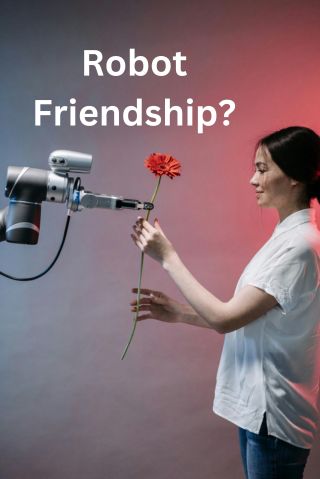Sex
Who's Most Interested in Sex with Robots?
What predicts "robosexuality"? New research identifies three surprising factors.
Posted March 25, 2024 Reviewed by Devon Frye
Key points
- "Robosexuality" is openness to having sex with robots.
- A new study finds that people with open, unrestricted sexual attitudes are less interested in sex with robots.
- People with hostile sexist beliefs or who believe some groups are better than others are more interested.
- Sex with robots appears to be related to people's views of power relations between people.

Imagine that you've won a raffle from a robot manufacturer, which allows you to try out a robot from their adult brand of sex robots. Would you do it?
New research by Connor Leshner and Jessica Johnson posed this scenario to undergraduate students from a western Canadian university to better understand robosexuality–attitudes towards and interest in sexual relations with robots. They identify several broader attitudes that predicted this interest, and their results suggest people’s interest in sex robots is tied to deeper issues about social relations.
What the Study Found
Leshner and Johnson collected data on three attitudes they thought would be related to robosexuality:
- Sociosexual orientation: This measures people’s attitudes towards more monogamous versus more open sexual attitudes. People who score highly on this tend to be more interested in casual sex, and tend to believe more strongly that, for example, “sex without love is OK.”
- Hostile sexism: People who score more highly on this scale tend to view gender relations as competitive and full of conflict, and to see women as trying to control men.
- Social dominance orientation: This measures a person’s desire to support and maintain a ranking of different groups, with some being higher than others. This can mean supporting ideas that people from some racial groups, some social classes, some genders, or people having certain sexual orientations, should be ranked below others.
They used these different attitudes to predict how interested people were in sex with robots. The results indicated that people with more open sexual attitudes were less likely to be interested in sex with robots.
This was the opposite of what the researchers expected. They thought that people more open to casual and unrestricted sexual relations might also be more open to robot sex.
On reflection, however, this result might be more related to met versus unmet sexual needs. People who are open to more casual sexual experiences might feel like their more adventurous sexual lives meet their sexual needs. Adding sex robots into the mix doesn’t “meet a need” for them. On the other hand, for people who are unlikely to have open sexual relationships, robot sex might feel like a safer way to explore sexuality.
This also raises the issue of whether people consider robot sex to be cheating or not. Leshner and Johnson review literature suggesting that it might come down to whether people see the sex robot as more like a partner (in which case it is cheating) or more like a sex toy (in which case it isn’t cheating). This study wasn’t able to tease these things apart.
The Role of Sexism and Social Dominance in Robosexuality
Another key finding: People higher in hostile sexism were more likely to be interested in sex with robots. This result opens the door to bigger questions.
First, it’s worth noting that men tended to be more interested in sex with robots than women. Statistical modeling showed that this relationship could be partially explained by hostile sexism. In other words, men who wanted sex with robots also tended to have anger and distrust of women. The robot may offer an alternative to women that they find easier to trust. Alternatively, the robot may be a sexual object that they can treat with disdain—which is how they already want to treat women.
Finally, people higher in social dominance orientation–the desire to maintain status differences between groups–were also more likely to be interested in sex with robots.

Here we also see how larger social attitudes may be driving an interest in sex robots. People who see some groups of people as less valuable than others also appear to be more interested in sex robots. It may be that these people already see others as being more like objects to use, and so also using a robot as a sex object feels more natural.
What These Findings Revel About Our Relationships to Robots, Sex, and Each Other
Overall, these results paint an unsettling picture of what drives people to interest in sex with robots. It seems that it’s not people who are more adventurous and open about sexuality who want it; it’s people—more often men than women—who hold hostile attitudes toward others. They see certain groups of people as less valuable and may be especially angry and distrustful of women. They may already follow social scripts that involve sexual dominance, so they may be more comfortable seeing robots as another sexual object to use.
It’s worth noting that the pattern of results was the opposite for friendship with robots. People higher in hostile sexism and social dominance orientation were less likely to want to be friends with robots. (Sexual openness wasn’t related to robot friendship either way.) This suggests that these attitudes say something particular about sex with robots—not just attitudes towards robots in general.
Though research is ongoing, this study suggests that sex with robots is in part about power relations. Those who want to dominate others are more likely to want sex with robots. This may divert some of that “dominating energy” away from real human people—but it may also reinforce negative scripts that treat others as sexual objects.
As an aside, my regular readers may be wondering why I'm covering this study. It's because Connor was in the first undergraduate class I ever taught—and now he’s publishing his own research!
References
Leshner, C. E., & Johnson, J. R. (2024). Technically in love: Individual differences relating to sexual and platonic relationships with robots. Journal of Social and Personal Relationships, 02654075241234377.




